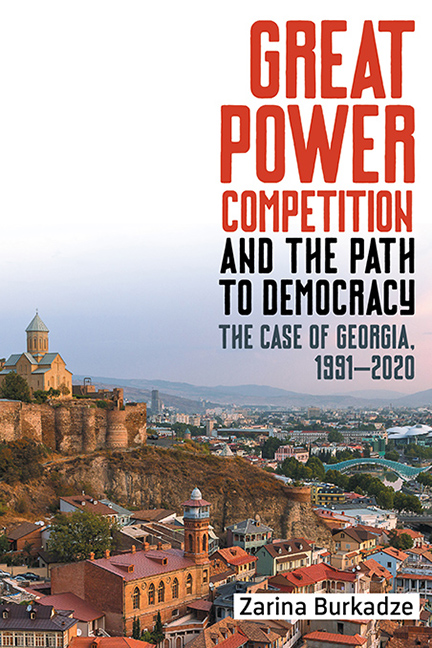Book contents
- Frontmatter
- Contents
- Preface
- List of Acronyms and Abbreviations
- Introduction: The Puzzle of Georgian Democratization
- 1 Autocracy and Democracy in Georgia: What Made the Difference?
- 2 Democratization without Great Power Competition, 1991–1993
- 3 Pluralizing Geopolitical Space, 1993–2003
- 4 The Dictatorship of Democrats, 2003–2012
- 5 Democratic Arrival? 2012–2020
- 6 Democracies In-Between
- Conclusion
- Appendix: List of Interviews
- Bibliography
- Index
1 - Autocracy and Democracy in Georgia: What Made the Difference?
Published online by Cambridge University Press: 16 July 2022
- Frontmatter
- Contents
- Preface
- List of Acronyms and Abbreviations
- Introduction: The Puzzle of Georgian Democratization
- 1 Autocracy and Democracy in Georgia: What Made the Difference?
- 2 Democratization without Great Power Competition, 1991–1993
- 3 Pluralizing Geopolitical Space, 1993–2003
- 4 The Dictatorship of Democrats, 2003–2012
- 5 Democratic Arrival? 2012–2020
- 6 Democracies In-Between
- Conclusion
- Appendix: List of Interviews
- Bibliography
- Index
Summary
Russia in Georgia
In this chapter, I introduce the foreign influences that acted upon the Georgian political process to establish a context for the rest of the book. Georgia has long been a priority for Russian foreign policy. Russia has influenced Georgian domestic politics and shaped the policy choices that Georgian leaders could make for at least two political generations. During the Soviet period, Georgian leadership lacked the democratic skills for managing the political process, making the country vulnerable to authoritarian pressures. Post-Soviet institutions failed to accommodate conflicting parties, which subsequently provoked civil and separatist conflicts. In the midst of this post-Soviet moment, Russia emerged as a vocal supporter of forces aligned against Zviad Gamsakhurdia, the first democratically elected president of Georgia. Gamsakhurdia was a leader of the national movement and rapidly gained popular support, particularly in western Georgia. As a dissident, he played a key role in defeating the communist regime, and as a president, he counteracted Russia's postimperial policies in Georgia. Until 2000, Georgia staggered on the path toward the West. Despite Western humanitarian aid and democratic investments, there was no official declaration or determination about Georgia's foreign policy orientation. The question of alignment was widely debated by political elites and the broader population. In the discussion of foreign policy choices, three dominant elite groups emerged: adherents of political neutrality, hesitant supporters of Western influence, and Westernizers. Followers of political neutrality explicitly declared pro-Russian sentiments and promoted anti-Western narratives, thus excluding any membership in Western military or political alliances. Hesitant supporters were not in opposition to Western aspirations but were handicapped by their Soviet background, which made it impossible to find a common language with democratic outsiders. They were willing to dismantle the old system but understood that they had fewer opportunities to survive under a democratized system. The crudeness of Russian politics toward Georgia skewed the sentiments of undetermined adopters to the West. Westernizers enthusiastically advocated for democratization and for orienting to the West. Westernizers were predominantly liberal-minded politicians with a Western education, who regarded the United States, NATO, and EU as counterweights to Russian influence. Hesitant supporters of Western influence and Westernizers successfully defined domestic and foreign policy objectives during this period.
- Type
- Chapter
- Information
- Great Power Competition and the Path to DemocracyThe Case of Georgia, 1991-2020, pp. 23 - 53Publisher: Boydell & BrewerPrint publication year: 2022



